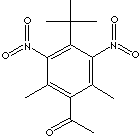PRODUCT IDENTIFICATION

H.S. CODE
UN NO.
3077
TOXICITY
CLASSIFICATION
EXTRA NOTES
PHYSICAL AND CHEMICAL PROPERTIES
MELTING POINT
SOLUBILITY IN WATER
REFRACTIVE INDEX
GENERAL DESCRIPTION & APPLICATIONS
Local: Musk: any of various powerful-smelling substances obtained originally from the musk glands of male musk deer during the mating season for sexual attraction or from certain animals such as otter or civet. It is used in perfume as a scent and fixative. It is obviously the first importance in perfumery as it features the better properties in not only penetration but also persistency than any other known substance. It scents huge space without even small loss of weight. But synthetic musks should replace for natural must to protect animals. Muscone, 3-Methylcyclopentadecanone, is the major constituent of natural musk. The odoriferous nucleus of natural musk is the C-16 cyclic ketone (cyclopentadecanone). But synthetic musklile products are based on the symmetry of the three nitro groups or on polycyclic and cyclopentadecanone structure. The synthetic musklike products include:
APPEARANCE
OTHER INFORMATION
- Nitro Class
- Musk Xylol (2,4,6-Trinitro-1,3-dimethyl-5-tert-butylbenzene, CAS RN: 81-15-2 )
- Musk Ketone (4'-tert-Butyl-2',6'-dimethyl-3',5'-dinitroacetophenone, CAS RN: 81-14-1 )
- Musk Ambrette (4-tert-Butyl-2,6-dinitro-3-methoxytoluene, CAS RN: 83-66-9)
- Musk Tibetene (5-tert-Butyl-1,2,3-trimethyl-4,6-dinitrobenzene, CAS RN: 145-39-1 )
- Musk Moskene (2,3-Dihydro-1,1,3,3,5-pentamethyl-4,6-dinitro-1H-Indene, CAS RN: 116-66-5)
- Polycyclic Musk Class
- Musk GX (1,3,4,6,7,8-Hexahydro-4,6,6,7,8,8-hexamethyl-cyclopenta-gamma-2-benzopryan, CAS RN: 1222-05-5 )
- Tonalide (1-(5,6,7,8-Tetrahydro-3,5,5,6,8,8-hexamethyl-2-naphthyl)ethan-1-one, CAS RN: 1506-02-1)
- Celestolide (4-Acetyl-6-t-butyl-1,1-dimethylindan, CAS RN: 13171-00-1)
- Phantolide (5-Acetyl-1,1,2,3,3,6-hexamethyl indan, CAS RN: 15323-35-0)
- Traseolide (5-Acetyl-3-isopropyl-1,1,2,6-tetramethylindane, CAS RN: 68140-48-7)
- Versalide (1,1,4,4-Tetramethyl-6-ethyl-7-acetyl-1,2,3,4-tetrahydronaphthalene, CAS RN: 88-29-9)
- 3,4,6,7,8,9-Hexahydro-4,6,6,9,9-pentamethyl-1H-naphtho[2,3-C]pyran (CAS RN: 1922-67-4)
- 2,4-Dimethyl-2-(1,1,4,4-tetramethyltetralin-6-yl)-1,3-dioxolane (CAS RN: 131812-67-4)
- Macrocyclic Class
- Muscone (3-Methylcyclopentadecanone CAS RN: 541-91-3)
- Exaltone (Cyclopentadecanone, CAS RN: 502-72-7)
- Cervolide (1,6-Dioxacycloheptadecan-7-one, CAS RN: 6707-60-4)
- Musk Ambrettolide ((Z)-Oxacycloheptadec-8-en-2-one, CS RN: 123-69-3)
- Exaltolide (Oxacyclohexadecan-2-one, CAS RN: 106-02-5)
- Musk T (1,4-Dioxacycloheptadecane-5,17-dione, CAS RN: 105-95-3)
- Ambrettolide (Oxacycloheptadec-10-en-2-one, CAS RN: 28645-51-4)
- Civetone ((Z)-9-Cycloheptadecen-1-one, CAS RN: 542-46-1)
- Cyclopentadecanone (CAS RN: 502-72-7)
- Ambretone (5-Cyclohexadecenone, CAS RN:37609-25-9)
- Musk R1 (11-Oxahexadecanolide, CAS RN: 3391-83-1 )
- 1,4-Dioxacyclohexadecane-5,16-dione (CAS RN: 54982-83-1)